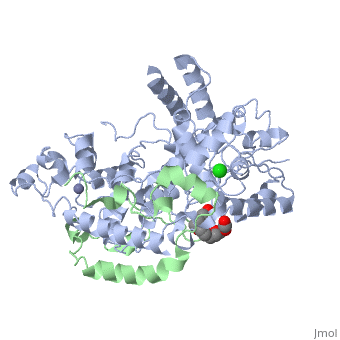Period circadian protein
From Proteopedia
(Difference between revisions)
| Line 12: | Line 12: | ||
== Structural highlights == | == Structural highlights == | ||
| - | There are numerous interactions between PER and cryptochrome. The <scene name='77/774060/Cv/3'>strongest are those formed by the cryptochrome terminal helix</scene> and by the <scene name='77/774060/Cv/4'>Zn+2 ion which forms tetrahedral interactions: 2 with PER and 2 with cryptochrome</scene><ref>PMID:24855952</ref>. | + | There are numerous interactions between PER and cryptochrome. The <scene name='77/774060/Cv/3'>strongest are those formed by the cryptochrome terminal helix</scene> and by the <scene name='77/774060/Cv/4'>Zn+2 ion which forms tetrahedral interactions: 2 with PER and 2 with cryptochrome</scene><ref>PMID:24855952</ref>. <scene name='77/774060/Cv/5'>Cl coordination site</scene>. |
</StructureSection> | </StructureSection> | ||
Revision as of 12:42, 22 November 2017
| |||||||||||
3D Structures of period circadian protein
Updated on 22-November-2017
4dj2 – mPER1 homolog Cry domain – mouse
4ct0 – mPER2 homolog Cry domain + cryptochrome-1
4u8h – mPER2 homolog Cry domain + cryptochrome-2
3gdi – mPER2 homolog PAS domain
4dj3 – mPER3 homolog residues 108-411
3rty, 1wa9, 3gec – PER PAS domain – Drosophila melanogaster
References
- ↑ Chen ST, Choo KB, Hou MF, Yeh KT, Kuo SJ, Chang JG. Deregulated expression of the PER1, PER2 and PER3 genes in breast cancers. Carcinogenesis. 2005 Jul;26(7):1241-6. Epub 2005 Mar 24. PMID:15790588 doi:http://dx.doi.org/10.1093/carcin/bgi075
- ↑ Schmalen I, Reischl S, Wallach T, Klemz R, Grudziecki A, Prabu JR, Benda C, Kramer A, Wolf E. Interaction of Circadian Clock Proteins CRY1 and PER2 Is Modulated by Zinc Binding and Disulfide Bond Formation. Cell. 2014 May 22;157(5):1203-15. doi: 10.1016/j.cell.2014.03.057. PMID:24855952 doi:http://dx.doi.org/10.1016/j.cell.2014.03.057

